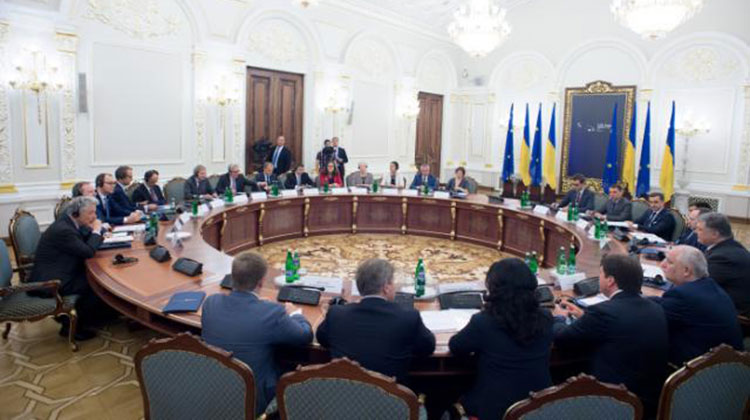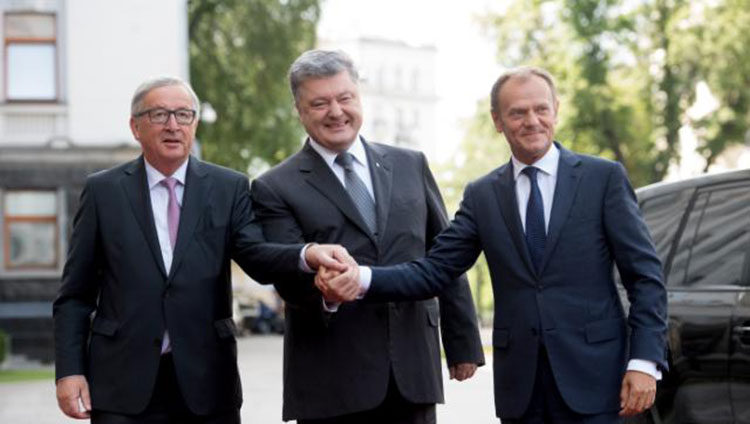Meeting in Kyiv on 12-13 July, EU and Ukrainian leaders celebrate the ratification of the association agreement and the recent introduction of visa-free travel to the EU for Ukrainians, both of which are fundamental steps towards reinforcing the EU-Ukraine partnership.
Speaking at the joint press conference, the President of the European Commission, Jean-Claude Juncker said: “More steps have been taken in the last three years than in the previous twenty, Ukraine should be proud of what it has achieved”.
“This Summit is a good moment to celebrate the strong and deepening friendship between the European Union and Ukraine” said Donald Tusk, European Council President
Leaders discussed:
- the importance of pursuing an ambitious reform process, especially in the fight against corruption.
- the conflict in eastern Ukraine and Russia’s illegal annexation of Crimea and Sevastopol, including the implementation of the Minsk agreements
- ways to maximise the benefits/potential of the EU-Ukraine association agreement
The European Union was represented by Donald Tusk, the President of the European Council, and Jean Claude Juncker, the President of the European Commission. Ukraine was represented by President Petro Poroshenko.
EU-Ukraine association agreement
Leaders welcomed the ratification by all EU countries of the association agreement, including the deep and comprehensive free trade area. The agreement will enter into force on 1 September 2017.
“…for me the key sentence of the Association Agreement still is that, and I quote, ‘the European Union acknowledges the European aspirations of Ukraine and welcomes its European choice’”.
Donald Tusk, European Council President
- EU-Ukraine Association Agreement
- Ukraine: Council adopts EU-Ukraine association agreement (press release, 11/07/2017)
Most of the association agreement is already operational. Many political and sectoral parts of the agreement have been provisionally applied since 1 September 2014, while its trade part, the deep and comprehensive free trade area (DCFTA), has been provisionally applied since 1 January 2016. Trade between the EU and Ukraine continued to grow over this period of time and the EU has reinforced its position as Ukraine’s primary partner. Trade between the two grew by almost 30% in the first quarter of 2017 compared to the first quarter of 2016.
 Crisis and conflict in Ukraine
Crisis and conflict in Ukraine
EU reiterated its support for Ukraine’s independence, sovereignty and territorial integrity. Leaders called for the full implementation of the Minsk agreements and underlined Russia’s specific responsibility in implementing the agreements.
As there had been no progress in the implementation of the Minsk agreements, EU leaders gathered at the June summit in Brussels decided to prolong economic sanctions against certain sectors of the Russian economy.
“And today, the EU has again made clear that we stand steadfastly behind Ukraine against Russia’s aggression and attempts to subvert your independence”, said President Donald Tusk after the summit.
In addition, the Council had recently extended the sanctions by one year in response to the illegal annexation of Crimea and Sevastopol by Russia. At the EU-Ukraine summit in Kyiv, the EU has reiterated its commitment to its non-recognition policy.
Reform agenda
EU leaders called on Ukraine to continue the implementation of its reforms, especially measures against corruption.
Leaders highlighted the concrete results achieved with EU support programmes.They stressed the importance of implementing all the policy measures attached to disbursement of the third tranche of the programme by the end of the year.
They also discussed priorities for EU assistance in 2017, which include support to public finance management, eastern Ukraine regions and energy efficiency, and technical assistance in support of key reforms and the implementation of the association agreement.
Visa liberalisation
The summit was a good opportunity for leaders to welcome the recent entry into force of the EU visa-free regime for Ukrainians.
As of 11 June 2017, all Ukrainian citizens with a biometric passport can travel to the EU for up to 90 days for business, tourist or family purposes without visa.




